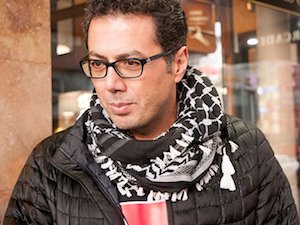 Dr. Ramzy BaroudRamzy Baroud -- World News Trust
Dr. Ramzy BaroudRamzy Baroud -- World News Trust
March 31, 2019
The aims of the Great March of Return protests, which began in Gaza on March 30, 2018, are to put an end to the suffocating Israeli siege and implementing the Right of Return for Palestinian refugees who were expelled from their homes and towns in historic Palestine 70 years earlier.
But there is much more to the March of Return than a few demands, especially bearing in mind the high human cost associated with it.
According to Gaza's Ministry of Health, over 250 people have been killed and 6,500 wounded, including children, medics and journalists.
Aside from the disproportionately covered "laming kites" and youth symbolically cutting through the metal fences that have besieged them for many years, the March has been largely non-violent. Despite this, Israel has killed and maimed protesters with impunity.
A UN human rights commission of inquiry found last month that Israel may have committed war crimes against protesters, resulting in the killing of 189 Palestinians within the period March 30 and Dec. 31, 2018.
The inquiry found “reasonable grounds to believe that Israeli snipers shot at children, medics and journalists, even though they were clearly recognizable as such,” the investigators concluded as reported by BBC online.
Many in the media, however, still do not understand what the Great March of Return really means for Palestinians.
A cynically titled report in the Washington Post attempted to offer an answer. The article, "Gazans have paid in blood for a year of protests. Now many wonder what it was for," selectively quoted wounded Palestinians who, supposedly, feel that their sacrifices were in vain.
Aside from providing the Israeli military with a platform to blame the Hamas Movement for the year-long march, the long report ended with these two quotes:
The March of Return "achieved nothing," according to one injured Palestinian.
"The only thing I can find is that it made people pay attention," said another.
If the Washington Post paid attention, it would have realized that the mood among Palestinians is neither cynical nor despairing.
The Post should have wondered: if the march "achieved nothing," why were Gazans still protesting, and the popular and inclusive nature of the March has not been compromised?
“The Right of Return is more than a political position,” said Sabreen al-Najjar, the mother of young Palestinian medic, Razan, who, on June 1, 2018, was fatally shot by the Israeli army while trying to help wounded Palestinian protesters. It is “more than a principle: wrapped up in it, and reflected in literature and art and music, is the essence of what it means to be Palestinian. It is in our blood.”
Indeed, what is the "Great March of Return" but a people attempting to reclaim their role and be recognized and heard in the struggle for the liberation of Palestine?
What is largely missing from the discussion on Gaza is the collective psychology behind this kind of mobilization, and why it is essential for hundreds of thousands of besieged people to rediscover their power and understand their true position, not as hapless victims, but as agents of change in their society.
The narrow reading, or the misrepresentation of the March of Return, speaks volumes about the overall underestimation of the role of the Palestinian people in their struggle for freedom, justice and national liberation, extending for a century.
The story of Palestine is the story of the Palestinian people, for they are the victims of oppression and the main channel of resistance, starting with the Nakba -- the creation of Israel on the ruins of Palestinian towns and villages in 1948. Had Palestinians not resisted, their story would have concluded then, and they, too, would have disappeared.
Those who admonish Palestinian resistance or, like the Post, fail to understand the underlying value of popular movement and sacrifices, have little understanding of the psychological ramifications of resistance -- the sense of collective empowerment and hope which spreads amongst the people. In his introduction to Frantz Fanon’s ‘Wretched of the Earth”, Jean-Paul Sartre describes resistance, as it was passionately vindicated by Fanon, as a process through which “a man is re-creating himself.”
For 70 years, Palestinians have embarked on that journey of the re-creation of the self. They have resisted, and their resistance in all of its forms has molded a sense of collective unity, despite the numerous divisions that were erected amongst the people.
The March of Return is the latest manifestation of the ongoing Palestinian resistance.
It is obvious that elitist interpretations of Palestine have failed -- Oslo proved a worthless exercise in empty clichés, aimed at sustaining American political dominance in Palestine as well as in the rest of the Middle East.
But the signing of the Oslo Accord in 1993 shattered the relative cohesiveness of the Palestinian discourse, thus weakening and dividing the Palestinian people.
In the Israeli Zionist narrative, Palestinians are depicted as drifting lunatics, an inconvenience that hinders the path of progress -- a description that regularly defined the relationship between every western colonial power and the colonized, resisting natives.
Within some Israeli political and academic circles, Palestinians merely ‘existed’ to be "cleansed" to make room for a different, more deserving people. From the Zionist perspective, the ‘existence’ of the natives is meant to be temporary. “We must expel Arabs and take their place,” wrote Israel’s founding father, David Ben Gurion.
Assigning the roles of dislocated, disinherited and nomadic to the Palestinian people, without consideration for the ethical and political implications of such a perception, has erroneously presented Palestinians as a docile and submissive collective.
Hence, it is imperative that we develop a clearer understanding of the layered meanings behind the Great March of Return. Hundreds of thousands of Palestinians in Gaza did not risk life and limb over the last year simply because they required urgent medicine and food supplies.
Palestinians did so because they understand their centrality in their struggle. Their protests are a collective statement, a cry for justice, an ultimate reclamation of their narrative as a people -- still standing, still powerful and still hopeful after 70 years of Nakba, 50 years of military occupation and 12 years of unrelenting siege.
– Ramzy Baroud is a journalist, author and editor of Palestine Chronicle. His forthcoming book is ‘The Last Earth: A Palestinian Story’ (Pluto Press, London). Baroud has a Ph.D. in Palestine Studies from the University of Exeter (2015) and was a Non-Resident Scholar at Orfalea Center for Global and International Studies, University of California Santa Barbara. His website is www.ramzybaroud.net





